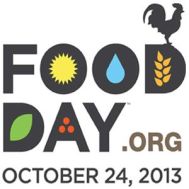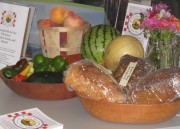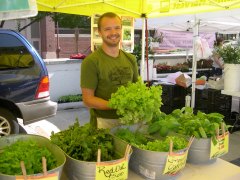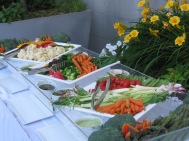As students go back to school to start their spring semester, finding a summer internship is definitely on their to-do list, and now is the time when employers are looking for talented students to fill their organizational needs. So each year Bethesda Green hosts Fields of Green Internship Fair to connect highly qualified students who are looking for opportunities in the environmental sector with DC metro area’s green employers. Getting ready for the event this year, we decided to share a series of profiles (wrapped up with this edition) about some of the amazing interns who have worked with us recently.
 Meet Natalia Salazar. Natalia graduated from Mount Holyoke College in May 2013 with a degree in Environmental Studies and a concentration in Ecosystem Science. Since September 2013, she has been interning at Bethesda Green and Calleva Farm, focusing on sustainable agriculture. She is passionate about building a local, ethical, and sustainable food system.
Meet Natalia Salazar. Natalia graduated from Mount Holyoke College in May 2013 with a degree in Environmental Studies and a concentration in Ecosystem Science. Since September 2013, she has been interning at Bethesda Green and Calleva Farm, focusing on sustainable agriculture. She is passionate about building a local, ethical, and sustainable food system.
How did you hear about Bethesda Green? After the end of my last semester in college, I started searching online for green internships in Bethesda. The first link that came up was Bethesda Green’s list of internships from the 2013 Fields of Green Internship Fair. Thanks to this list, I found out about Bethesda Green and Calleva, and I am enjoying wonderful opportunities at both places.
The best thing about interning at Bethesda Green is the chance to work on a project of my interest and receive all the support and resources I need to complete my project. I especially love the level of involvement I’m granted in the Greening Restaurants program and the exposure to the local sustainability world. Thanks to my internship at BG, I have learned a great deal about restaurants serving delicious, local, seasonal food in downtown Bethesda that I previously had not know about.
What do you do at Bethesda Green? Since I started my internship at Bethesda Green, I’ve been immersing myself in the topic of sustainable agriculture. I’m helping to bring a local food day in downtown Bethesda and creating a webpage within the BG site to educate the public about sustainable agriculture, our county’s agricultural reserve, and sources for local food.
I am most passionate about environmental stewardship, health, animal welfare, and social justice. I also love the outdoors, traveling, dancing, cooking, and eating.
One thing I do to protect the environment is drive a small, fuel-efficient car. My goal, however, is to drive an electric car powered by clean energy sources.
Future goals/plans? This fall I hope to enroll in the University of Maryland’s Environmental Science and Technology M.S. program. I would like to do research and gain expertise on sustainable agriculture and soil.
_________________
Maddy Go is currently a senior at Bethesda-Chevy Chase High School, interning at Bethesda Green for the fall and spring semesters.
How did you hear about Bethesda Green? I was looking for an internship in the environmental field as part of my school’s internship program, and a quick Google search brought me to Bethesda Green’s website. After meeting with Bethesda Green staff, I started interning months later in the fall.
The best thing about interning at BG…is the extremely welcoming and encouraging Bethesda Green staff. BG is a great environment to learn and grow, and that’s made possible entirely by them.
What do you do at Bethesda Green? Anything that’s needed, including working on the database, the BG website, media outreach, and my own personal project. With the help of Bethesda Green, I’ve recently been able to begin to renovate my school’s greenhouse, which has been a fantastic experience for me.
I am most passionate about finding innovative ways to do things and exploring new ideas, especially in the environmental field.
One thing you do to protect the environment? Whenever I go out I try to carpool, take public transportation, or walk/bike.
Future goals/plans? This year I’m going to head to college and begin my undergraduate studies in environmental science. However, things are still uncertain down the road. Hopefully I’ll be able to take advantage of study-abroad opportunities, or try World Wide Opportunities on Organic Farms (WWOOF) or the Peace Corps.
















